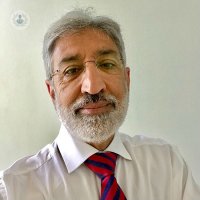Geriatricians and the value of personalised care
Written by:Getting older brings many challenges and lifestyle changes that can be hard to adapt to. It is not uncommon that older patients, typically from age seventy onwards, may suffer from more than one condition and require a cocktail of medication to treat various symptoms or health conditions, be they mild or severe. Managing this can be a challenge for both patients and doctors. In this article, respected consultant physician in general and geriatric medicine, Dr Tarun Solanki, explains how older people can benefit from specialised geriatric care tailored to their individual needs.

What is a geriatrician and what benefit may an older person get from consulting one?
Many people are unaware of the specialty of geriatrics. It is one of the largest medical specialities in the UK. Geriatricians, like any other specialists, are highly trained and skilled doctors with specialist training in dealing with people with multiple conditions and recognising the possible interactions between various conditions and the medications prescribed.
Geriatricians are also experts in frailty which is defined as a distinctive health state related to the ageing process in which multiple body systems gradually lose their in-built reserves. Around ten per cent of people aged over sixty-five have frailty, rising to between a quarter and a half of those aged over eight-five.
While most patients we see are older people often in their eighties and nineties, younger individuals with multiple conditions or frailty may also benefit from the expertise of a geriatrician. Geriatricians are experts in enabling people to manage their multiple conditions and to lead as active and independent a life as possible.
How do geriatricians assess the needs of their patients?
Older people have usually acquired multiple medical problems throughout their long lives and as such, they can be more complicated to treat. A geriatrician will assess a patient holistically and look not only at the multiple medical issues they may have but also how it impacts their day to day functioning. This is also know as Comprehensive Geriatric Assessment (CGA).
We often see patients who have been seen by a range of specialists for an individual condition, an organ problem for example. However these specialists have frequently failed to see the person behind the condition and how their various conditions impact them as a person.
In addition, as a result of the many conditions older patients may have, they may be taking multiple medications. While the medication may be appropriate and in line with current guidance for the single organ needing treatment, it may be having a harmful effect on another organ. The other issue is that the more medications a patient takes, the more likely they are to suffer from harmful interactions between different drugs.
Who would be a good candidate for tailored geriatric care with a specialist?
Not only do older people make more complicated patients to treat, they do not typically present with the classical features seen in younger adults which can make diagnosing and treating the patient even harder. Many older people may present with falls, funny turns, incontinence and confusion. There are numerous underlying causes for any of these symptoms and the skill of a geriatrician is to tease out the relevant cause and remedy it if possible.
Let’s consider an example: Annie, a 95 year old lady who has been unsteady on her feet lately and has suffered a few minor falls. She is being treated for high blood pressure with three medications and additionally takes a blood thinner to treat an irregular heartbeat. She has high blood pressure while lying down but it plummets on standing, making her feel unsteady. She also has to rush to the loo and because of her unsteadiness, she has recently not made it to the toilet in time.
After an assessment and discussion, we agree on a plan to decrease some of her blood pressure medication, which includes a diuretic. Diuretics, or water pills, are commonly prescribed to treat high blood pressure but have the obvious side effect of frequent urination which in Annie’s case is problematic. In consultation, we also agree to a reduction in the dose of her blood thinning medication. She is also given advice on how to manage her blood pressure drop on standing.
When Annie is seen for a review, her unsteadiness has been resolved, the urgency to get to the toilet was improved and as a consequence she was able to retain a better quality of life and continue living in her own home.
If you feel that you, or someone you know would benefit from tailored geriatric care, you can book a consultation with Dr Tarun Solanki by visiting his Top Doctors profile.


